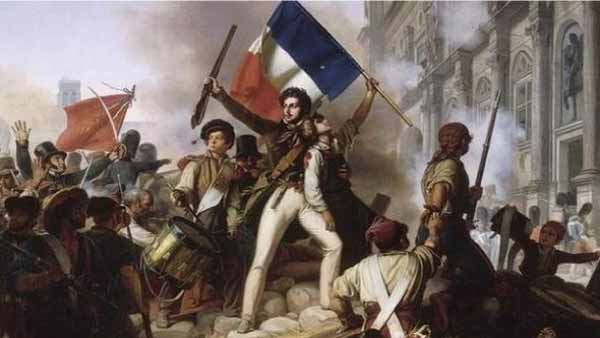The French Revolution was a period of intense political and social change in France that lasted from 1789 to 1799. It was a movement that aimed to end the Ancien Régime, a political and social system that had been maintained in Europe for centuries.
The French Revolution began with the storming of the Bastille, a fortress in Paris that symbolized the power of the French monarchy. After the storming of the Bastille, popular assemblies were formed throughout France and a constitutional monarchy was established.
Over the next few years, the French Revolution experienced several periods of intense violence, including the execution of King Louis XVI and Queen Marie Antoinette, as well as the War of the First Coalition against a coalition of European states opposing the Revolution.
The French Revolution was also a period of great advances in the struggle for human rights and equality. The Declaration of the Rights of Man and of the Citizen, proclaimed in 1789, established the fundamental rights and freedoms that are now considered universal.
The French Revolution was a movement that had a profound impact on politics, culture, and society in France, as well as around the world. It was a period of radical change that changed the way power and human rights were understood and exercised around the world.
Causes of the French Revolution
The French Revolution was caused by a combination of factors, including growing economic and social inequality, dissatisfaction with absolute monarchy, the influences of the Enlightenment and ideas of democracy and human rights, and the financial crisis in which France found itself.
Main events of the French Revolution
In addition to the storming of the Bastille, some of the most significant events of the French Revolution include the proclamation of the French Republic, the execution of King Louis XVI and Queen Marie Antoinette, the reign of Terror, the adoption of the Constitution of 1791, and the abolition of the nobility and monarchy.
Important figures of the French Revolution
The French Revolution involved a wide range of important characters, including Maximilien Robespierre, leader of the radical faction known as the Jacobins; Napoleon Bonaparte, who emerged as a major figure in the revolutionary wars and eventually became the leader of France; and Olympe de Gouges, a women’s rights advocate who wrote the Declaration of the Rights of Women and Citizens.
Impact of the French Revolution
The French Revolution had a lasting impact on the history of France and the world. It inspired revolutionary movements in other countries, including Haiti and Latin America. It also established the principle of popular sovereignty and the idea that power resided in the people and not in the monarchy or nobility. In addition, the French Revolution paved the way for the expansion of suffrage and equal rights for all citizens, regardless of their social background.
Political and social reform
The French Revolution brought with it important political and social reforms. The Constitution of 1791 established a constitutional monarchy and a National Assembly elected by French citizens. The Declaration of the Rights of Man and of the Citizen of 1789 established fundamental rights and freedoms, including freedom of speech, religious freedom, and the right to a fair trial.
Economic reform
The French Revolution also brought important economic changes. The abolition of privileges and nobility meant that taxes were applied to the entire population and not just to the peasants. In addition, the French Revolution opened up opportunities for social mobility, allowing people to move up in society based on their merit and not just their social background.
The war
The French Revolution also had a significant impact on the war in Europe. French territorial expansion during the French Revolutionary Wars (1792-1802) laid the foundations of Napoleon’s French Empire. The Napoleonic Wars (1803-1815) had a lasting impact throughout Europe and established France’s dominance over much of the continent before its eventual defeat in 1815.
Legacy
The legacy of the French Revolution continues to be the subject of debate and discussion around the world. It has been argued that the French Revolution paved the way for modern democracy and human rights. It has also been criticized for its violence and legacy of terror, as well as for its role in the expansion of imperialism and conquest.
In short, the French Revolution was a period of intense political, economic and social change in France that had a lasting impact on the history of Europe and the world. Despite criticism, the French Revolution is still seen as an important milestone in the struggle for human rights and equality around the world.
Phases of the Revolution
Is usually divided into three phases. The first phase (1789-1792) focused on the creation of a constitutional monarchy and the drafting of the Constitution of 1791. The second phase (1792–1794) was a period of conflict and war that included the execution of King Louis XVI, the rise of the radical Jacobin faction led by Maximilien Robespierre, and the reign of Terror. The third phase (1795-1799) was characterized by the creation of a new Constitution and the coming to power of Napoleon Bonaparte.
The Reign of Terror
The Reign of Terror was a period of violence and political repression in France that lasted from 1793 to 1794. During this time, the Jacobins, led by Robespierre, carried out a series of public executions of their political opponents, including nobles, clerics, and ordinary citizens. It is estimated that between 16,000 and 40,000 people were executed during this period.
The Role of Women in the Revolution
Women played an important role, although their contributions have often been downplayed in history. French women fought for their political and civil rights, and some even joined political clubs and wrote pamphlets and essays. They also participated in demonstrations and marches, and some women even fought in the Revolutionary Wars.
The Role of the Revolution in the Abolition of Slavery
The Revolution had a significant impact on the abolition of slavery. In 1794, the French National Convention abolished slavery in all French colonies, making France one of the first European countries to abolish slavery. However, this measure was briefly revoked in 1802 during the reign of Napoleon before being definitively re-established in 1848.


